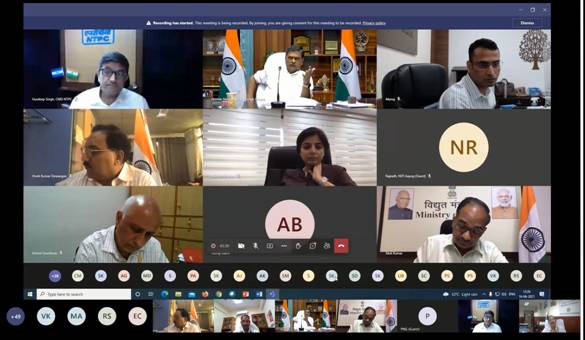Ministry of Power
Shri R K Singh, Minister of State (Independent Charge) for Power reviews progress of energy transition and energy efficiency measures in the context of Climate Change
Committee/ Group to be set up having members from all relevant Ministries for implementation of roadmap on energy efficiency and low carbon technologies : Shri R. K Singh
Ministries to keep focus on sectors with highest emissions intensity and ensure that wastage of energy is minimized. : Shri R. K. Singh
Deployment of low carbon technologies need to be taken up on a massive scale, especially in MSMEs; Electric Mobility should be more aggressively pushed : Shri R K Singh
Posted On:
17 JUN 2021 9:18AM by PIB Delhi
Shri R.K. Singh, Minister of State ( Independent Charge) for Power , New and Renewable Energy and Minister of State Skill Development and Entrepreneurship chaired a high level meeting to review the progress of various energy efficiency programmes and the preparedness for Climate Change Actions in the country through video conferencing yesterday .
The purpose of this high level meeting was to discuss activities in the field of energy efficiency across all the sectors of the economy with the objective of reducing CO2 emissions.
Shri Singh directed to keep focus on sectors with highest emissions intensity such as Transport, MSMEs and Power plants. He discussed the activities defined under the Mission document – ROSHANEE – which has been developed for implementing a series of Energy Conservation schemes across the country.
He advised the Ministries to take appropriate measures on the demand side initiatives to ensure that the wastage of energy is minimized and said that the deployment of low carbon technologies need to be taken up on a massive scale, especially in the MSMEs, where it is highly essential. He instructed all the departments that Electric Mobility also should be more aggressively pushed.
Shri R K Singh, stressed that for better implementation of all energy efficiency schemes, the institutional mechanism in Bureau of Energy Efficiency, CPSU under Ministry of Power would be strengthened. The State agencies will also need to be strengthened to scale up energy efficiency efforts. He further emphasized to take following actions:
· Progressive Electrification of economy: Detailed action plan to be developed to identify potential areas;
- Greening of Electricity – a concerted push for Renewables is already underway.
- A Committee/ Group to be setup having members from all relevant Ministries for implementation of the Roadmap on Energy Efficiency and low carbon technologies;
- Strengthening of organizational structure of Bureau of Energy Efficiency and in the states.

The High-Level meeting had senior officials from Ministry of Power, Ministry of Environment Forest and Climate Change, Ministry of New and Renewable Energy, Ministry of Housing and Urban Affairs, Ministry of External Affairs, Ministry of Coal, Ministry of Road Transport and Highways, Department of Expenditure, Department of Heavy Industry, NITI Aayog, CEA, BEE, NTPC, PFC, REC, EESL, IREDA and SECI.
Secretary Ministry of Power , Shri Alok Kumar highlighted that cooling sector , cold storage and cooking are key areas to focus on for successfully achieving our targets for CO2 emission reduction. He also discussed possibilities of exploring shift of Goods movement from Road Transport to Railways. It was highlighted by Secretary , Power that Power Finance Corporation, a CPSU under the Ministry, would be the nodal agency for facilitating Energy Efficiency Financing and act as a knowledge -based champion organization for various financing programs. Financing for MSMEs remains a key challenge.
Director General, Bureau of Energy Efficiency gave a presentation on Climate Change and India’s NDC Commitments and the actions envisaged under the Mission ROSHANEE. Bureau of Energy Efficiency has developed two programs namely ROSHANEE and UNNATEE laying down the Sector wise action plan for the period 2021-2030. Mission ROSHANEE envisages various activities in the field of energy efficiency across all the sectors of the economy with the objective of reducing CO2 emissions by more than 550 million tonnes in the country by 2030 whereas UNNATEE is a working document, having short term and long-term action plans for lowering energy intensity.
***
SS/IG
(Release ID: 1727776)
Visitor Counter : 956